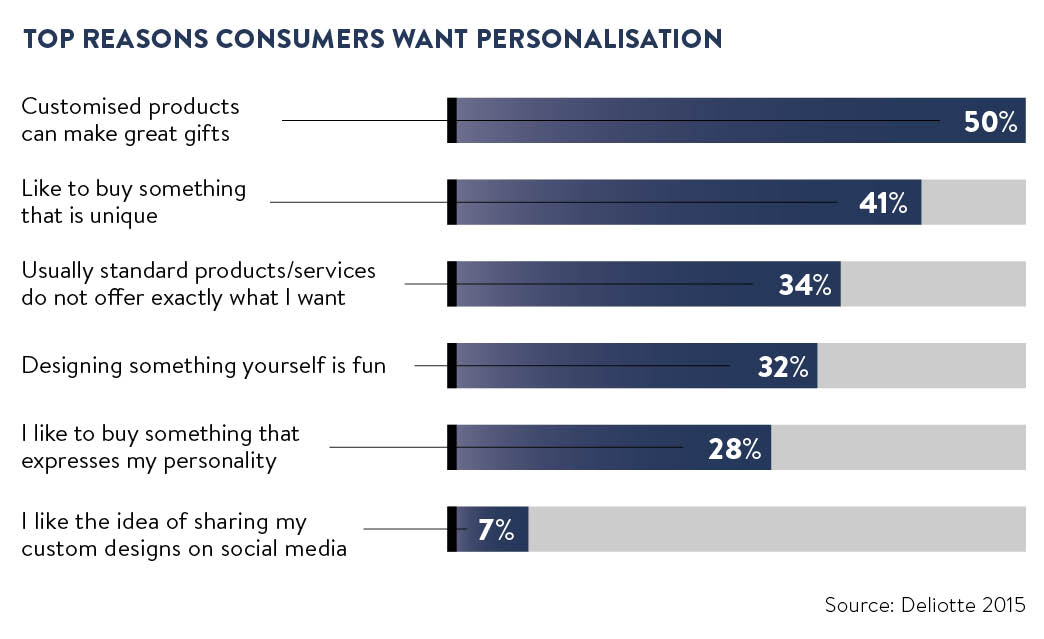The new manufacturing revolution will be defined by speed, quality, flexibility – and customisation. “The customer is king” has never been more relevant and manufacturers have to react or risk perishing.
Henry Ford’s famous line “A customer can have a car painted any colour that he wants, so long as it is black” set the tone in 1909 for the mass production of near-identical products. Today mass customisation, the ability to make variations in products in high volume, is becoming the norm.
The iconic JCB backhoe loader has 50 main variants and then a further 150 attachment combinations, creating 7,500 main product permutations. “Within each of the 50-plus variants, there is almost an unlimited number of specification variants, according to choice of paint colour, tyre choice, trim, air con/no air con and more,” says JCB’s communications director John Kavanagh.
This high degree of variation needs to be managed across four production lines globally and requires huge investment in information technology that synchronises orders with each production site, to schedule each unit for the right on-time delivery.
Taking customisation to the next level
Such customisation in the automotive and machinery sector is now routine; giving the customer what they want is now a business pillar, rather than a differentiator. Bespoke mobile phone maker Vertu has taken this to a new level. With its Made to Order service you can design the phone from a pre-defined selection of materials, while the Bespoke service lets you literally create your own. Coverings such as calf and alligator leathers and embedded precious stones make each phone unique. The cost? “In the Made to Order programme, a top-of-the-range handset would cost about £25,000, in the Bespoke programme there literally is no limit,” says Vertu’s brand manager Peggy Li.
Mass customisation, the ability to make variations in products in high volume, is becoming the norm
BAC Mono is not a mass-produced car; production of the Liverpool-made street-legal racing car will climb to 50 cars a year in 2017. But it was designed from the start to be different, a one of a kind. Customers have a personal fitting: both the steering wheel and seat are moulded to fit the owner. The steering wheel is then 3D printed, a fast and responsive method, while the seat is cut from the mould and finished individually.
“We use a personalised paintwork configuration tool to explore the possibilities with each individual customer – what the client wants, the client gets,” says Ian Briggs, BAC co-founder and design director. “Modern technology has enabled us not only to react to customer demand faster than ever before, but also to offer a level of bespoke fitment that would have been cost prohibitive only a few years ago for a low-volume, luxury car manufacturer like BAC.”
But the big potential for customisation lies in the technology to manufacture normal, functional products the way the market wants them and to reduce the time from order to delivery.

Keeping it competitive
Booth Dispensers in Blackpool makes coolers and drinks dispensers. The company reduced the lead time for their main product from eight weeks to 24 hours. This was achieved because the company completely re-engineered the product from one with many variations where each is assembled to order at different stages. Now Booth, which exports 40 per cent of its output, makes a single base unit in series, using modular construction, and does all the customisation as late as possible. This is not just a different plastic facia for each customer, the engineering and the control system are also customised.
“It is how we can compete with cheaper far-eastern imports,” says managing director Phil Booth. “Through re-engineering for configurable manufacturing, we can now turn around a product in 24 hours. Our Asian competitors cannot do that.”
US company Normal allows the customer to scan their ear with a smartphone and then sends him or her a tailor-made, 3D-printed earphone. “It’s one of the most brilliant examples of a business customising a product for a market of one,” says manufacturing industry manager at Autodesk, Asif Moghal. Normal is clever; it keeps the rest of the package mass produced – the speakers, cables and the 3mm jack. They have personalised the bit that adds the most value.
The technology
“The secret of mass personalisation is to offer people the ability to change the geometry, performance and specification of the product, and then feed it into a range of manufacturing techniques to exploit the personalisation,” says Mr Moghal. This could mean some companies scrapping a load of redundant machine tools and filling their factory with 3D printing robots – not a realistic strategy for many. The path to personalised manufacturing will be incremental for many as they customise small, high-value bits first and buy the new flexible technology as they can afford it.
Software, of course, is at the heart of the evolution. Product life cycle management (PLM) systems now integrate at a deeper level with enterprise resource planning systems (ERP), where ERP can tell the PLM system whether a degree of product variation is unprofitable for the business.
“Personalisation if often delivered through software,” says Theo Boudewijns, PLM specialist at software developer PTC. “We are developing a system where a company can link its PLM system to a physical product and deliver personalised software into those devices.”
Taking customisation to the next level

